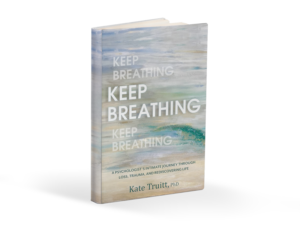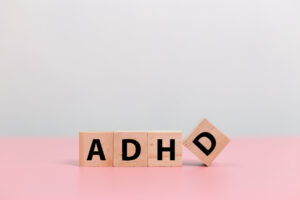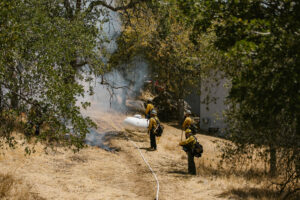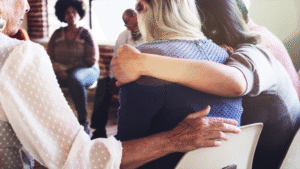Related Resources
For Dealing With Grief and Loss
Why Relationships Suddenly Change After Loss & Tips to Help
In this psychoeducation, Dr. Kate Truitt begins by reminding us that humans are really bad at death. When we experience loss, our relationships can change drastically. They can ghost us or disappear, shift the way they communicate with us, or might not engage the way they used to. In this psychoeducational video, she delves into why relationships suddenly change after loss and provides tips for healing.
Tips for how to Support a Loved One as They're Navigating Grief & Loss
In this educational video, Dr. Kate Truitt addresses the complexities of supporting someone who is navigating a grief and loss journey. She encourages us all to engage empathetically and self-compassionately when dealing with grief and loss. She advocates for maintaining our presence in the lives of those who are grieving, and not hesitating to address complex and emotionally charged questions.
Why Relationships Suddenly Change After Loss
By Dr. Kate Truitt
Life throws us a lot of curveballs, and loss is one of the most difficult to navigate. Whether it’s the passing of a loved one, a broken relationship, or the loss of a job or dream, these experiences leave a profound mark. But it’s not just our own world that gets shaken – the impact of loss often ripples outward, affecting the very foundation of our closest relationships.
Have you ever felt like things suddenly changed with a friend or family member after a significant loss? Maybe communication became strained, or you felt a distance you couldn’t quite explain. This feeling is all too common. I want you to know you are not alone in this. In this psychoeducational video, which is also linked in the sidebar, I delve into why relationships suddenly change after loss.
How Loss Impacts Individuals

To understand why relationships change after loss, it’s important to understand the nature of grief itself. Although widely recognized, these stages aren’t prescriptive; many will experience them in a different order, or not at all. But what’s crucial to grasp is that grief isn’t just about coming to terms with the absence of what was lost; it’s about internalizing the change it brings and adapting to it. In this psychoeducational video about embracing the multidimensional journey of grief taken from one of our recent workshops, we’re diving deep into the world of grief.
Within the context of relationships, each stage can manifest in unique and unpredictable ways. A person who has lost a loved one may find that their irritation and anger at the situation inadvertently affects their relationships with others. Spouses may experience a deep sense of loneliness, even in each other’s company, which can trigger a range of emotional responses that fundamentally shift the dynamics of their partnership.
People who are mourning often withdraw into themselves, becoming less available for the emotional needs of their partners and friends. This withdrawal can be mistaken as a lack of love or care, leading to misunderstandings and strain on the relationship. Additionally, grief can unearth unresolved issues or expose the fragility of a relationship that was previously overlooked in the daily hustle.
Another factor that contributes to the fluctuation of relationships after loss is the individual coping mechanisms of those involved. One person might seek solace in socializing and sharing memories, while another may retreat inward, struggling to articulate their pain. These differences in approach can create a chasm in communication and mutual support, driving a wedge where there was once closeness.
Some relationship shifts after loss include:
- Bottled-up emotions: Grief can make it difficult to express what’s going on inside. We might struggle to find the words for our pain, anger, or confusion, leading to emotional silence and frustration.
- Misunderstandings on repeat: Withdrawn behavior can be misinterpreted as coldness, while emotional outbursts might be seen as blame or anger. This can create a cycle of misunderstandings that further strains communication.
- Feeling unsupported: Sometimes, loved ones who haven’t experienced the same kind of loss might struggle to understand what we need. This can lead to feelings of being unheard, unseen, and unsupported during a time of great vulnerability.
- New roles and responsibilities: Loss can necessitate a complete overhaul of roles within a relationship. For example, a surviving spouse might take on the responsibility of caring for children, creating new pressures and adjustments.
- Power struggles and resentment: People cope differently. If one person in a relationship seems to “bounce back” faster than the other, it can lead to power struggles or resentment.
- Intimacy: The emotional upheaval of loss can also affect intimacy in relationships. Some couples might find themselves withdrawing physically or emotionally, while others might find solace in increased closeness.
How Bonds Can Be Strengthened After Loss

When individuals choose to lean into their shared grief, opening up about their pain and offering mutual support, it can lay the groundwork for a closer, more resilient relationship. This shared vulnerability fosters a deep sense of empathy, understanding, and connection, transforming the sorrow of their loss into a powerful adhesive that binds them more tightly together.
When loss strikes, going through the experience with someone who understands can be incredibly comforting. Sharing memories, tears, and laughter can forge a deeper connection and strengthen existing bonds.
Loss can also make us acutely aware of the preciousness of life and the importance of the relationships we hold dear. This newfound appreciation can lead to increased affection, empathy, and commitment within a relationship.
Working together to navigate the challenges of grief can create a sense of solidarity and shared purpose. Supporting each other through the darkness can bring friends, couples, and families closer than ever before.
If you’re looking for tips on how to support a loved one navigating grief and loss, I invite you to watch this YouTube video, which is also linked in the sidebar of this article.
Some Reasons Why Relationships Struggle After Loss
Bottling up emotions or avoiding difficult conversations can create distance and resentment within a relationship. Open communication and a willingness to face the pain together are crucial for healing.
If partners or loved ones have vastly different coping mechanisms, it can lead to friction. One person might crave space, while the other needs constant support. Learning to navigate these differences and finding compromises can be a challenge.
It’s equally important to acknowledge that not all relationships weather the storm of grief in the same way. Different coping mechanisms and pent up emotions can create rifts between individuals simultaneously dealing with their own personal sorrows. If these differences remain unaddressed, what was once a source of support can become a source of misunderstanding and distance, potentially leading to the deterioration of the relationship. That’s why recognizing and respecting each other’s unique grieving processes, while challenging, is critical in navigating these turbulent waters without drifting apart.
How To Navigate Relationship Changes After Loss

Loss throws us off balance, and it’s natural for our relationships to feel unsteady too. But with a little effort and understanding, we can navigate these changes and emerge with stronger connections.
Here are some tips to help you weather the storm:
- Talk openly and honestly about your feelings with your loved ones. Let them know what kind of support you need, whether it’s a listening ear, a shoulder to cry on, or practical help with daily tasks.
- Remember, everyone grieves differently. Try to see things from your loved one’s perspective and offer compassion as they navigate their own emotional journey.
- Grief counseling can be a valuable resource for both individuals and couples struggling to cope with loss. A therapist can provide a safe space to process emotions, develop healthy coping mechanisms, and learn how to communicate effectively with loved ones.
- Healing takes time. Don’t put pressure on yourself or your relationships to return to “normal” immediately. Be patient with yourself and each other.
- Acknowledge and celebrate the small wins along the way. Every step forward, no matter how small, is a victory in the face of loss.
- Engaging in shared activities that honor the memory of the person you lost can be a powerful way to connect with loved ones. This could involve creating a memory box, volunteering for a cause they cared about, or simply reminiscing together.
It’s important to remember that changes in relationships after loss are absolutely normal. Grief is a complex journey, and it’s natural for our interactions with loved ones to shift and evolve as we navigate this challenging process.
While the initial impact of loss can feel isolating and disruptive, there is hope. Navigating relationship changes after experiencing a loss can be a complex and deeply emotional process. The dynamics of our relationships often shift in the wake of grief, leaving us to find a new balance in a world that feels forever changed.
In my book, “Keep Breathing: A Psychologist’s Intimate Journey Through Loss, Trauma, and Rediscovering Life,” I delve into the nuances of grief, healing, and the profound impact loss can have on our lives and relationships. Through a blend of personal narrative and scientific insight, the book offers guidance and support for those navigating the aftermath of loss. It’s a resource for anyone looking to find their way back to themselves and their loved ones with compassion and understanding.

In the following weeks and months, I’ll be doing more Instagram Lives with colleagues and friends about mental health topics. I invite you to connect with me on Instagram if you have any specific topic you want to be covered.
References
Sturtevant, P. B. (n.d.). Grief and Relationships: A field guide. Retrieved from https://paulsturtevant.com/grief-and-relationships/
Grief and Loss Center. (n.d.). How Grief Changes Us: Forever & for Now. Retrieved from https://mygriefandloss.org/how-grief-changes-us










